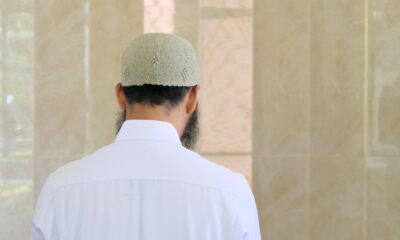One of the central themes of the month of Dhul-Hijjah is submission to the commandments of Allah and making sacrifices to gain closeness to him. When the prophet Ibrahim (peace be upon him) was confronted with the challenge of allegiance to his family or allegiance to Allah, he chose to submit to the almighty and supress his personal desires and love for his family.
Sayyiduna Zayd Ibn Arqam (may Allah be pleased with him) relates that the Companions asked, ‘O Messenger of Allah! What is Udhiya?’ He replied, ‘It is the Sunnah of your father Ibrahim (peace be upon him).’ They asked again, ‘What benefit do we get from it?’ He answered, ‘A reward for every hair (of the sacrificed animal).’ ‘And [what reward is there for animals with] wool, O Messenger of Allah?’ they asked. ‘A reward’, he said, ‘for every fibre of the wool.’
‘Udhiya’ is an Arabic term which means ‘sacrificing an animal’, and ‘Qurbani’ is an Urdu and Persian word derived from the Arabic word ‘Qurban’ which means an act performed to seek Allah’s pleasure. Today people use the word ‘Qurbani’ for the sacrifice of an animal slaughtered for the sake of Allah.
Virtues of Udhiya
The prophet Muhammad (peace and blessings be upon him) said: “There is nothing dearer to Allah during the days of Qurbani than sacrificing of animals. The sacrificed animal shall come on the Day of Qiyamah with its horns, hair and hooves (to be weighed). The sacrifice is accepted by Allah before the blood reaches the ground. Therefore sacrifice happily with an open heart.”
Whoever made a sacrifice with all sincerity, the act of sacrifice will protect him from hell-fire”
Time of Udhiya
- The time of udhiya begins after Eid prayer on the 10th of Dhul-Hijjah and ends on the 12th of Dhul Hijjah at setting of the sun.
- Udhiya can be done on any of the three days, but the first day (10th Dhul-Hijjah) is the most preferred day.
- It is permissible to perform Udhiya during the night, but performing it during the day is better.
- People living in a village where Eid Salaah is not performed are allowed to perform the Udhiya after the break of dawn on the 10th of Dhul-Hijjah.
- The three days of Eid, i.e. the 10th, 11th and 12th of Dhul-Hijjah are known as Ayyaamun Nahr (the days of slaughtering)
Who needs to perform Udhiya?
- Udhiya is Wājib on all sane Muslims (male and female) who have reached the age of puberty and possess the minimum amount of wealth that is liable for Zakat.
- The minimum amount of wealth that is liable for Zakat is 612.36 grams of silver or its equivalent in money, personal ornaments, stock-in-trade or any other form of wealth which is in excess of one’s basic personal,
- For Udhiya to be Wājib it is not necessary that the ownership of the above wealth be for a full year.
- Each adult member of a family who owns the above-mentioned wealth needs to perform his or her own udhiya.
- If a husband wants to do udhiya for his wife with his wealth, then the udhiya will be valid as long as he gains permission from his wife.
- Udhiya is not Wājib on travellers.
- Udhiya is not gains on minors.
- If a minor reaches the age of puberty, or a traveller reaches his home (becomes muqeem) or if a poor person becomes rich before the 3rd day of Eid (12th Dhul-Hijjah), then they also need to perform udhiya.
The Udhiya Animal
- The animals eligible for udhiya are goats, sheep, cattle and camels. No other types of animals are permitted for udhiya.
- It is permissible to use castrated and barren animals for udhiya
- Goats and sheep have to be at least one year old. However, a healthy sheep that looks like a one year old may also be used, provided it is at least six months of age.
- Cattle (cow, ox and buffalo) must be at least two years old.
- Camels must be at least five years old.
- Sheep and goats count as one share per animal. Cattle and camels are divided into seven shares; i.e. seven people can do udhiya of a camel or cattle.
- It is unlawful to sell the Udhiya meat or skin. If the skin is sold then the amount received should be given in charity.
In most western countries it is not always possible for an individual to perform udhiya himself; instead an agent like a butcher is used to perform the udhiya. In such cases it is of great importance that the animals are specified prior to the slaughter and that the specified carcass reaches the individual that has performed the udhiya. To ensure that the udhiya is done correctly one should try and used trustworthy butcher shops.
Distribution of the Meat
The person performing the Udhiya can eat or distribute the meat to whomsoever he pleases, but it is preferable that the meat be divided into three parts; one part for the home, one part for relatives and one part for the poor and needy. The meat or the skin of the animal cannot be given to an employee or to the butcher in payment for his labour. If the skin of the animal is sold then the amount received should be given in charity.
If a person has missed Udhiya out of negligence then he should give the price of the Udhiya as sadaqah to those entitled to receive zakat.
Cutting and Clipping the Hair and Nails
If a person intends to perform Udhiya then it is desirable for him or her to refrain from cutting or clipping their hair from the 1st of Dhul-Hijjah to the 10th of Dhul-Hijjah.

 Songs make hypocrisy grow in the heart just as water makes crops grow
Songs make hypocrisy grow in the heart just as water makes crops grow 
















